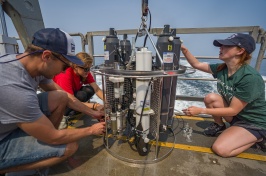Institute for the Study of Earth, Oceans, and Space (EOS)
Can Open Software Keep Our Water Supplies Safe?
UNH researchers are developing an open software platform to improve access to water resources data. Read More-
12/16/25
How to Stay Warm in the Cold This Winter: Tips From an Arctic Researcher
'Tis the season for bundling up against elements like blowing snow and aggressive wind chills. And who better to ask for tips on how to stay warm... -
12/14/25
RENU 3 Rocket Blasts Off With UNH Technology on Board
UNH scientists and students designed and built 10 space instruments to study atmospheric phenomena that affect satellites and GPS communications. -
12/01/25
Tiny Satellite Built by UNH Students Blasts Off to Space
When the Falcon 9 rocket blasted off the day after Thanksgiving, it carried with it years of hard work — and the hopes and dreams — of 26 UNH... -
11/14/25
Tracking Acidification in the Gulf of Maine
As ocean waters grow increasingly acidic, beloved shellfish like clams, oysters, scallops and lobsters — staples of coastal cuisine — face mounting...
Recent Stories
-
03/14/18 - Scienmag: Mowing the Lawn Less Often Improves Bee HabitatAlexandra R. Contosta co-authored the paper on pollinator habitat which was published this week in the journal Biological Conservation. Read More
-
03/11/18 - Fellow in PhysicsUNH professor of physics Benjamin Chandran was named a Fellow of the American Physical Society. Read More
-
03/09/18 - WMUR 9: Weather Instruments Developed by UNH Launched into SpaceThe technology is part of a suite of weather instruments created specifically for new NOAA satellites designed to better forecast weather. Read More
-
03/06/18 - Listening InFrom the waters of the Arctic to grasslands in Oklahoma, UNH researchers are using sound to see the world more clearly. Read More
-
03/06/18 - Keeping Great Bay GreatAcross the disciplines and decades, UNH research has helped understand and improve this valuable resource. Read More
-
03/05/18 - Better (Space) Weather ForecastsState-of-the-art space weather instruments developed by UNH researchers are heading into space. Read More
-
03/04/18 - Faculty HonorsUNH faculty members distinguished themselves with recent awards and appointments. Read More
-
03/04/18 - Space Science by the NumbersA quick look at six decades of UNH space science research. Read More
-
02/27/18 - WMUR 9: Report Shows Climate Change Will Hurt Winter Sports IndustryClimate scientist Elizabeth Burakowski says that New Hampshire’s higher elevation resorts should weather the change. Read More
-
02/23/18 - White GoldElizabeth Burakowski has co-authored a study from the organization Protect Our Winters. Read More






























































